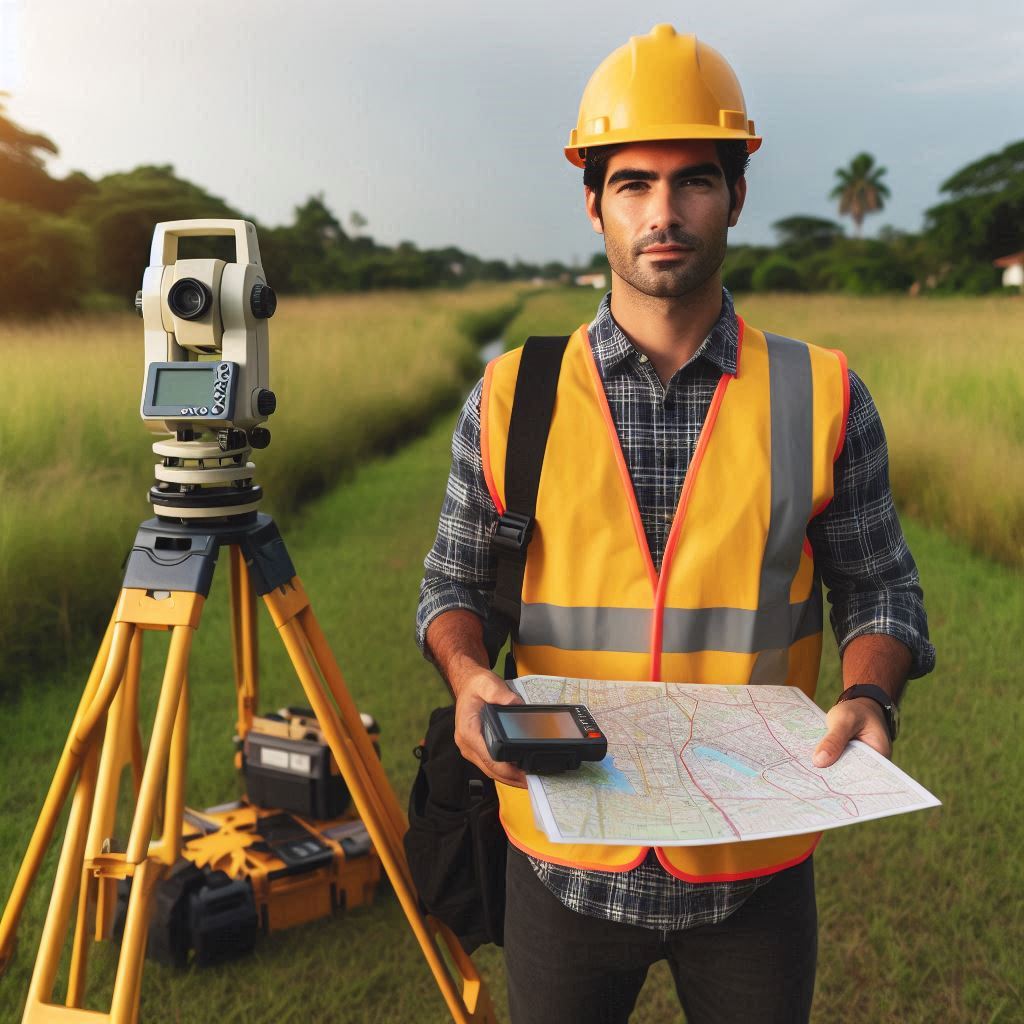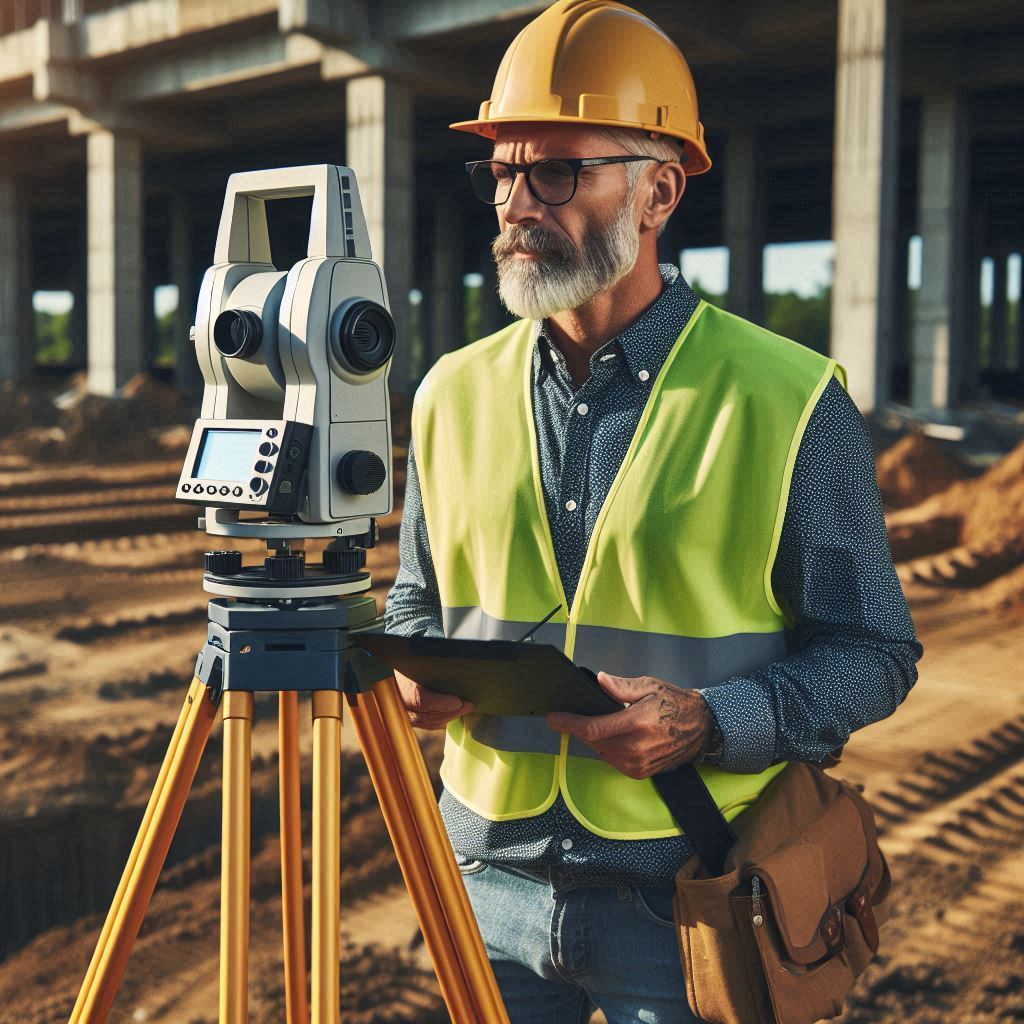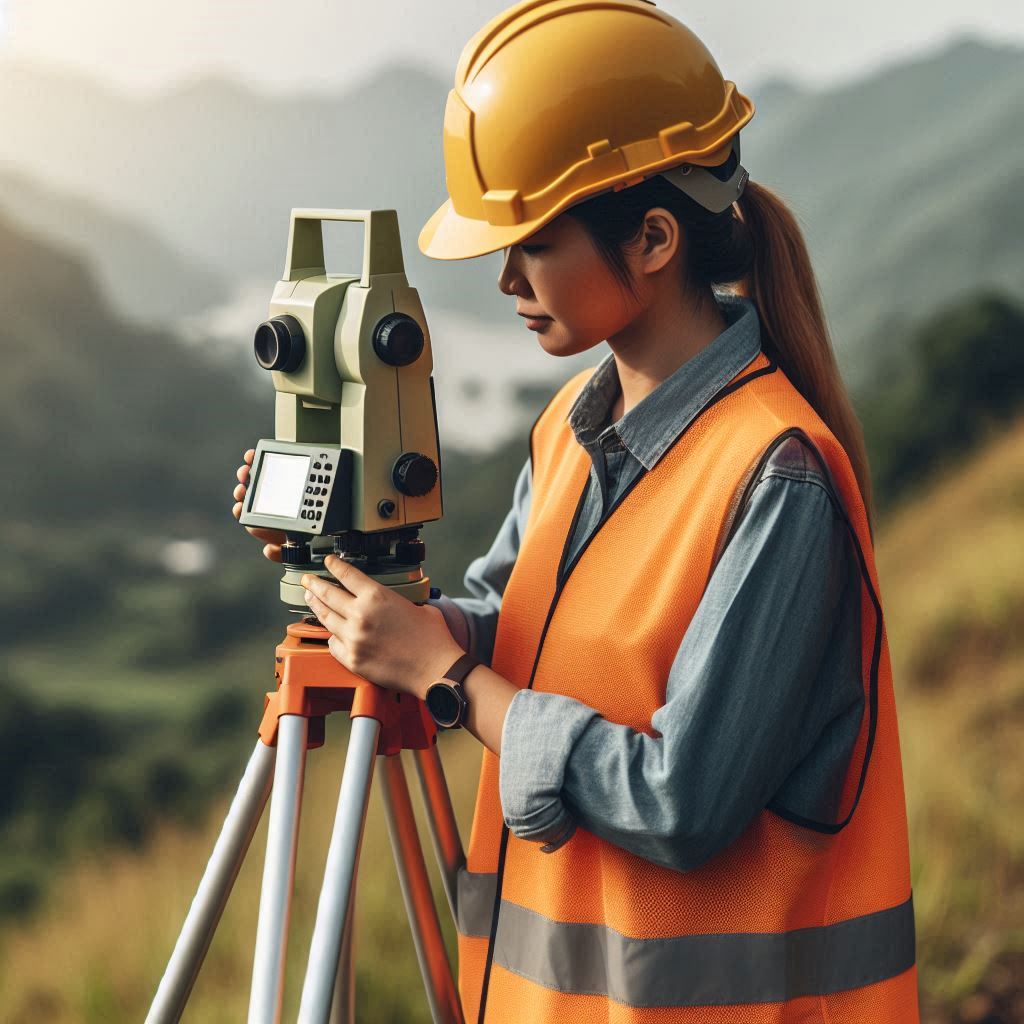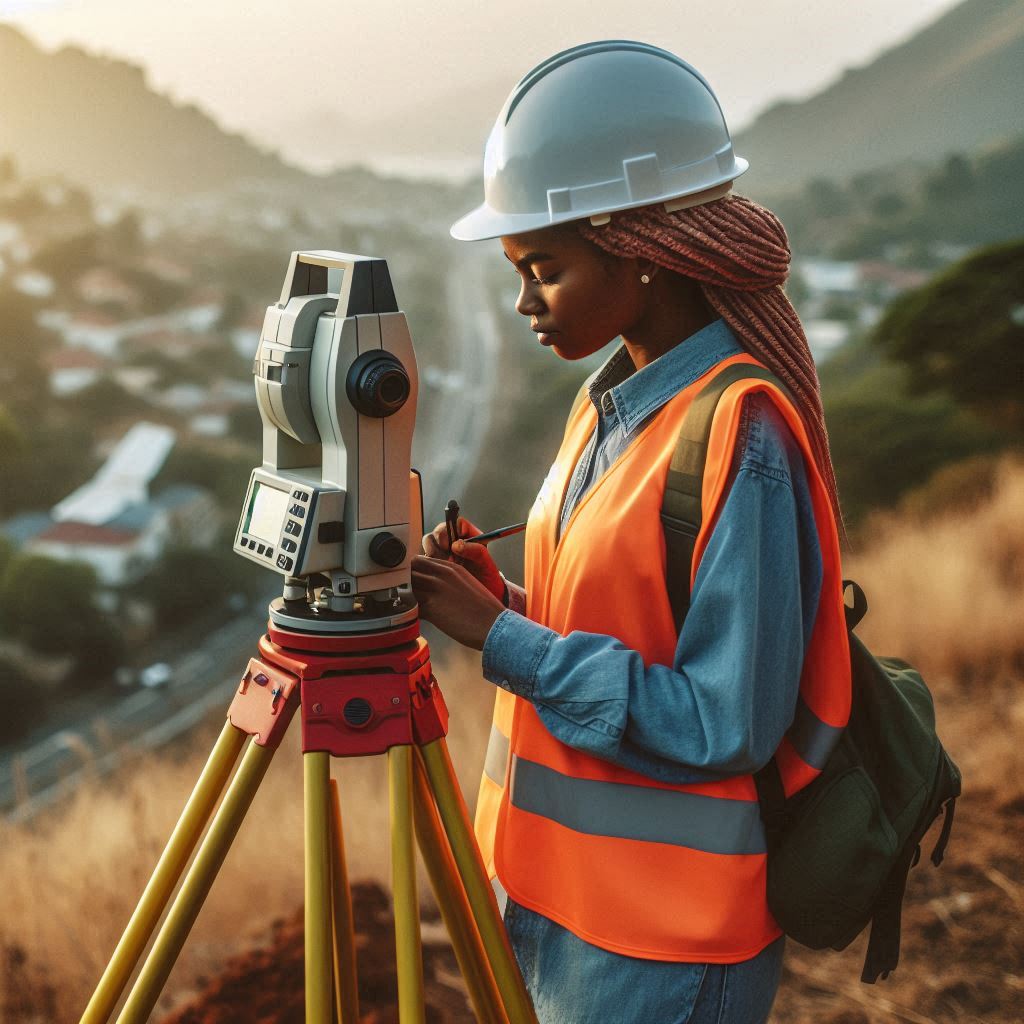Introduction
Overview of Surveying Technician Role
Surveying technicians are essential in measuring and mapping land accurately.
They operate advanced equipment to collect precise data used in construction and engineering projects.
Their work is crucial in ensuring that designs are feasible and compliant with regulations.
Importance of Surveying Technicians in Various Industries
Surveying technicians impact several industries by providing accurate land measurements.
They play a key role in construction, infrastructure development, and environmental management.
Their data ensures projects are executed correctly, minimizing errors and enhancing safety.
Without their expertise, many large-scale projects would face significant challenges.
The Main Points That Will Be Discussed in the Blog Post
This blog will explore the daily responsibilities of surveying technicians, their importance in various sectors, and the benefits of pursuing this career.
It will delve into how their work supports successful project outcomes and highlights the growing demand for their skills.
In summary, surveying technicians are vital across multiple industries, providing accurate data for construction and development.
Their skills ensure projects meet regulatory standards and are built on solid foundations.
With a rising demand for professionals in this field, it’s an excellent time to explore a career in surveying.
Consider becoming a surveying technician and make a significant impact on the world around you.
Overview of a surveying technician
The Role of a Surveying Technician
A surveying technician plays a crucial role in construction, engineering, and land development.
They are responsible for measuring and mapping land areas to support project planning and design.
Their work ensures accurate data collection, which is essential for building infrastructure and determining property boundaries.
The Primary Responsibilities of a Surveying Technician
The primary responsibilities of a surveying technician include operating surveying equipment and preparing detailed maps.
They use tools like total stations, GPS units, and levels to collect data.
Technicians also perform site inspections and check measurements for accuracy.
Their role involves interpreting data to create reports that guide engineers and architects.
They often work alongside surveyors, providing essential support in fieldwork and data analysis.
The Skills and Qualifications Required for the Job
To excel in this role, a surveying technician must possess a specific set of skills and qualifications.
First and foremost, they need a strong understanding of mathematics and geometry.
Proficiency in these areas helps in accurate measurement and data analysis.
Technical skills are equally important.
Technicians must be adept at using various surveying instruments and software.
Familiarity with Geographic Information Systems (GIS) and Computer-Aided Design (CAD) programs is often required.
Attention to detail is a key skill for a surveying technician.
Precision is critical in collecting and recording measurements to avoid costly errors.
Strong problem-solving abilities are also important.
Technicians often encounter unexpected challenges on-site and must find effective solutions quickly.
Good communication skills are necessary to collaborate with other professionals and explain technical data clearly.
Educational requirements for a surveying technician typically include an associate degree in surveying, civil engineering, or a related field.
Some positions may require certification from professional bodies, such as the National Society of Professional Surveyors (NSPS).
On-the-job experience is valuable, as it helps technicians become proficient in using surveying equipment and interpreting data.
In summary, a surveying technician is integral to the planning and execution of construction and land development projects.
Their role involves a combination of technical skills, attention to detail, and problem-solving abilities.
With the right education and experience, they play a key part in ensuring projects are accurately planned and executed.
Read: Graduate Studies in Biomedical Engineering
Daily tasks of a surveying technician
A Typical Day for a Surveying Technician
A typical day for a surveying technician starts early, often with a team briefing to discuss the day’s tasks.
They begin by traveling to various job sites, which could range from construction sites to undeveloped land areas.
Upon arrival, they set up their equipment and perform initial site inspections.
The day usually involves a mix of fieldwork and office tasks.
In the field, they gather data, take measurements, and ensure accuracy.
Back in the office, they process data, update maps, and prepare reports for review.
The day ends with organizing data and planning for the next site visit.
The Different Types of Surveying Tasks They May Perform
Surveying technicians perform various types of surveying tasks based on project requirements.
These tasks include land surveys to determine property boundaries, construction surveys to guide building placement, and topographic surveys to map terrain features.
They may also conduct hydrographic surveys to measure underwater features and geodetic surveys to determine large-scale land positions.
Additionally, technicians perform as-built surveys to document completed construction and boundary surveys for legal purposes.
Each task requires precise measurement and data collection to ensure accurate results.
The Equipment and Technology Used in Surveying
Surveying technicians use a range of equipment and technology to perform their tasks effectively.
Common tools include total stations, which combine electronic theodolites with distance measuring equipment.
GPS units are used for precise location tracking and mapping.
Levels help measure elevation changes, while laser scanners capture detailed 3D data of structures and terrain.
Technicians also use software like Geographic Information Systems (GIS) for mapping and Computer-Aided Design (CAD) for drafting.
Modern surveying often incorporates drones for aerial surveys, providing high-resolution images and data from difficult-to-reach areas.
The combination of these tools ensures accurate and efficient data collection for various surveying projects.
Read: Biomedical Engineering: Impact on Public Health
Fieldwork vs. office work
Compare and Contrast the Fieldwork and Office Work Aspects of a Surveying Technician’s Job
Fieldwork and office work are both essential aspects of a surveying technician’s job, each with distinct roles and environments.
Fieldwork involves outdoor activities where technicians collect data directly from job sites.
This includes setting up equipment, taking measurements, and inspecting the land.
It requires physical endurance, adaptability to weather conditions, and hands-on problem-solving.
In contrast, office work is centered around processing and analyzing the data collected during fieldwork.
Technicians use computer software to create detailed maps, interpret data, and generate reports.
This setting demands strong analytical skills, proficiency with software tools, and meticulous attention to detail.
While fieldwork is dynamic and requires immediate decision-making, office work is more structured and involves methodical data analysis.
The Importance of Accuracy and Attention to Detail in Both Settings
Accuracy and attention to detail are crucial in both fieldwork and office work.
In the field, precise measurements are essential for the integrity of the data collected.
Any errors in measurements or data recording can lead to significant inaccuracies in the final results.
Technicians must be diligent in setting up equipment and verifying measurements to avoid mistakes.
In the office, accuracy is equally important as technicians process and analyze data.
Errors in data interpretation or mapping can lead to flawed reports and misinformed decisions.
Attention to detail ensures that the final outputs are reliable and useful for project planning and execution.
Both settings require a high level of precision to ensure that the surveying work meets professional standards and project requirements.
How Field Data is Collected and Processed in the Office
Field data collection begins with surveying technicians using equipment like total stations, GPS units, and levels to gather measurements and observations.
They record data points, take photographs, and note any relevant site conditions.
This raw data is then transported back to the office for processing.
In the office, technicians input the collected data into specialized software.
Geographic Information Systems (GIS) and Computer-Aided Design (CAD) programs are commonly used to create detailed maps and diagrams.
The data is analyzed to identify patterns, verify measurements, and generate reports.
This processed information helps in creating accurate representations of the surveyed area, which are used for project planning and decision-making.
The office work transforms raw field data into actionable insights, highlighting the critical link between field observations and data analysis.
Read: Biomedical Engineering: Industry Outlook 2024

Collaboration with surveyors and engineers
The Relationship Between Surveying Technicians, Surveyors, and Engineers
Surveying technicians, surveyors, and engineers each play distinct yet interconnected roles in a surveying project.
Surveyors oversee the overall surveying process, ensuring that the measurements and data collection align with project requirements and regulatory standards.
They are responsible for the strategic planning of surveys and often interpret the data collected.
Surveying technicians support surveyors by handling the technical aspects of data collection.
They operate the equipment, gather measurements, and perform initial analyses.
Their work provides the essential data that surveyors use to make informed decisions and create accurate reports.
Engineers rely on the data provided by surveyors and technicians to design and implement projects.
They use the measurements and maps to plan construction, infrastructure, and other engineering solutions.
The collaboration between these professionals ensures that projects are executed based on accurate and reliable information.
How Surveying Technicians Assist in Surveying Projects
Surveying technicians assist in surveying projects by executing fieldwork and data collection tasks.
They set up and operate surveying equipment, such as total stations and GPS units, to measure land features and boundaries.
Technicians also ensure that the data collected is accurate and reliable, often performing preliminary checks and calibrations.
Once data is collected, technicians process and organize it for further analysis.
They input the data into software programs to create detailed maps and reports.
This information is crucial for surveyors and engineers to make informed decisions about project planning and execution.
Technicians also assist by preparing field reports and documenting any site-specific conditions that might impact the project.
Their detailed work supports the surveyor’s analysis and helps engineers understand the land’s characteristics, leading to more precise and effective project outcomes.
The Importance of Communication and Teamwork in the Surveying Process
Effective communication and teamwork are essential in the surveying process.
Surveying technicians, surveyors, and engineers must collaborate closely to ensure that data collection and project requirements align.
Clear communication helps in understanding project goals, addressing any issues that arise, and ensuring that everyone is on the same page regarding data interpretation and project outcomes.
Teamwork is critical for coordinating fieldwork and data analysis.
Technicians need to relay accurate and timely information to surveyors, who then provide guidance and make decisions based on the data.
Engineers depend on this collaborative effort to design projects that are feasible and compliant with the gathered data.
In summary, the relationship between surveying technicians, surveyors, and engineers is based on mutual reliance and collaboration.
Each role contributes to the successful completion of a surveying project, with effective communication and teamwork being key to achieving accurate and reliable results.
Read: How Agricultural Engineers Improve Crop Yields
Transform Your Career Today
Unlock a personalized career strategy that drives real results. Get tailored advice and a roadmap designed just for you.
Start NowChallenges faced by surveying technicians
Common Challenges Faced by Surveying Technicians in Their Daily Work
Surveying technicians encounter various challenges in their daily work.
One common challenge is dealing with unpredictable weather conditions, which can impact data collection and equipment functionality.
For example, heavy rain or extreme temperatures may affect the accuracy of measurements and the performance of electronic instruments.
Another challenge is working in difficult or hazardous environments, such as uneven terrain, construction sites, or densely vegetated areas.
Navigating these environments can be physically demanding and may require additional safety precautions.
Technicians also face challenges related to equipment malfunctions or calibration issues.
Ensuring that all instruments are functioning correctly and are properly calibrated is essential for accurate data collection.
Additionally, they must manage the complexity of data collection and ensure that it aligns with project specifications and standards.
How Surveying Technicians Overcome Obstacles in the Field
Surveying technicians use several strategies to overcome obstacles encountered in the field.
To handle unpredictable weather, they prepare by checking forecasts and planning work around adverse conditions.
They also use weather-resistant equipment and protective gear to minimize the impact of weather on their work.
In challenging environments, technicians use specialized equipment designed for rough terrain and difficult conditions.
For instance, they may use ruggedized GPS units and all-terrain vehicles to navigate and collect data efficiently.
Safety protocols, such as wearing protective clothing and conducting hazard assessments, help mitigate risks in hazardous areas.
When faced with equipment issues, technicians perform routine maintenance and pre-work checks to ensure everything is in working order.
They also carry backup equipment and repair tools to address any problems quickly.
Calibration procedures are regularly followed to maintain accuracy, and technicians stay updated on best practices for equipment use.
Examples of Problem-Solving Techniques Used by Surveying Technicians
Surveying technicians employ various problem-solving techniques to address issues in the field.
For example, if a measurement is inconsistent, they might recheck the equipment setup and recalibrate instruments to ensure accuracy.
If environmental conditions interfere with data collection, they may adjust the timing of their work or use alternative methods to gather the required information.
In cases where equipment malfunctions, technicians often use diagnostic tools to identify and resolve issues on-site.
They may troubleshoot problems by consulting equipment manuals or contacting technical support for guidance.
When navigating complex terrains or obstacles, technicians might use advanced surveying techniques, such as aerial surveys with drones, to obtain data from difficult-to-reach areas.
They can also modify their data collection approach, such as changing the positioning of equipment or adjusting measurement techniques, to adapt to the challenges they face.
In summary, surveying technicians encounter various challenges in their work, from weather conditions to equipment issues.
They overcome these obstacles through preparation, specialized equipment, and problem-solving techniques.
Their ability to adapt and find solutions is crucial for ensuring accurate and reliable data collection.
Read: The Impact of Aerospace Engineering on Modern Life
Career opportunities and advancement
Potential Career Paths for Surveying Technicians
Surveying technicians have several potential career paths within the surveying and construction industries.
Starting as a surveying technician, they can progress to roles such as a senior surveying technician or field supervisor, overseeing other technicians and managing more complex projects.
With experience, they might move into specialized areas such as geodetic surveying or hydrographic surveying, which involve advanced techniques and technologies.
Technicians can also transition into related fields like project management or construction management, leveraging their technical knowledge and experience in data analysis.
For those interested in further specialization, roles such as land surveyor or survey manager offer opportunities for increased responsibility and higher salaries.
Surveying technicians may also explore careers in urban planning or real estate, where their expertise in land measurement and analysis is valuable.
Opportunities for Further Education and Specialization
Further education and specialization can enhance career prospects for surveying technicians.
Pursuing additional certifications, such as becoming a licensed surveyor or obtaining certifications from professional organizations like the National Society of Professional Surveyors (NSPS), can open up advanced career opportunities.
Technicians can also enroll in degree programs or advanced courses in surveying, civil engineering, or geographic information systems (GIS).
These programs provide deeper knowledge and skills, preparing technicians for more specialized roles or leadership positions.
Specialization options include areas like environmental surveying, which focuses on assessing and managing natural resources, or forensic surveying, which involves gathering evidence for legal purposes.
Continuing education in these areas can lead to roles as experts in their respective fields.
The Potential for Advancement Within the Surveying Industry
The surveying industry offers substantial potential for career advancement.
As technicians gain experience and demonstrate their expertise, they can move into higher-level positions with increased responsibilities.
For instance, experienced technicians can become project managers, overseeing large-scale surveying projects and coordinating teams.
Opportunities for advancement also include moving into consulting roles, where technicians provide expert advice and solutions for complex surveying challenges.
Senior roles, such as survey manager or department head, involve strategic planning, client interactions, and business development, offering higher salaries and leadership opportunities.
Moreover, advancements in technology and the growing demand for precise data in various industries continue to expand career opportunities.
Technicians who stay updated with technological advancements and industry trends can position themselves for leadership roles and specialized positions that require cutting-edge expertise.
In summary, surveying technicians have diverse career paths, including roles in specialized surveying areas, project management, and related fields.
Further education and certification can enhance career prospects, and the industry offers significant potential for advancement through experience, specialization, and leadership opportunities.
Training and professional development
The Training and Certification Requirements for Surveying Technicians
To become a surveying technician, individuals typically need a combination of formal education and hands-on training.
The foundational requirement is an associate degree in surveying, civil engineering, or a related field.
Some positions may accept a high school diploma combined with relevant work experience, but a degree provides a more comprehensive understanding of surveying principles.
Certification is an important step for career advancement.
While certification requirements vary by region, common certifications include the Certified Survey Technician (CST) designation from the National Society of Professional Surveyors (NSPS) or similar certifications offered by state or local surveying boards.
Obtaining certification often requires passing exams that test knowledge and skills in surveying techniques and equipment.
Additionally, some technicians pursue further certifications, such as becoming a licensed land surveyor, which involves passing a licensing exam and meeting specific work experience requirements.
These certifications enhance career prospects and demonstrate a higher level of expertise.
The Importance of Ongoing Professional Development in the Field
Ongoing professional development is crucial for surveying technicians to stay current with industry advancements and maintain their skills.
The field of surveying is continuously evolving with new technologies and methodologies.
Keeping up with these changes ensures that technicians remain effective and competitive in their roles.
Professional development opportunities include attending workshops, webinars, and conferences related to surveying and geospatial technologies.
These events provide valuable insights into the latest tools, techniques, and industry trends.
Additionally, participating in continuing education courses or pursuing advanced certifications can deepen knowledge and open doors to specialized roles.
Networking with peers and joining professional organizations, such as the National Society of Professional Surveyors (NSPS) or the American Society of Civil Engineers (ASCE), offers access to resources, mentorship, and career development opportunities.
Staying engaged with the professional community helps technicians keep abreast of best practices and industry standards.
Resources for Individuals Interested in Becoming Surveying Technicians
Individuals interested in becoming surveying technicians can access various resources to guide their career path:
- Educational Institutions: Many community colleges and technical schools offer associate degree programs in surveying or related fields. Institutions such as the University of Maine or Purdue University provide specialized programs in surveying and geomatics.
- Certifying Bodies: The National Society of Professional Surveyors (NSPS) provides information on certification requirements and resources for preparing for certification exams. The American Congress on Surveying and Mapping (ACSM) also offers resources for professional development.
- Professional Organizations: Joining organizations like NSPS or the American Society of Civil Engineers (ASCE) offers networking opportunities, industry news, and access to professional development resources.
- Online Learning Platforms: Websites like Coursera and LinkedIn Learning offer courses related to surveying, GIS, and CAD that can help build relevant skills and knowledge.
- Industry Conferences and Workshops: Attending industry events, such as the International LiDAR Mapping Forum (ILMF) or regional surveying conferences, provides exposure to the latest technologies and industry practices.
In summary, becoming a surveying technician requires formal education, certification, and ongoing professional development.
Utilizing educational institutions, certifying bodies, professional organizations, and online resources can help individuals successfully enter and advance in the field.
Conclusion
The Key Points Discussed in the Blog Post
Surveying technicians are essential in various sectors, including construction, engineering, and land management.
They use advanced tools to measure and map land with high precision.
Their daily work involves interpreting data crucial for project success and regulatory compliance.
The Significance of Surveying Technicians in Various Industries
Surveying technicians ensure that construction projects are accurately planned and executed.
They play a vital role in infrastructure development, helping to create safe and functional environments.
Their expertise supports environmental conservation by providing accurate land assessments.
The accuracy and reliability of their data are key to the success of many projects.
Encouragement to Consider a Career as a Surveying Technician and Explore the Opportunities Available in the Field
If you’re looking for a dynamic and impactful career, consider becoming a surveying technician.
The field is expanding, with a strong demand for skilled professionals.
By entering this profession, you can contribute to significant projects and enjoy a rewarding career with diverse opportunities.
[E-Books for Sale]
The Big Book of 500 High-Paying Jobs in America: Unlock Your Earning Potential
$19.99 • 500 High-Paying Jobs • 330 pages
Explore 500 high-paying jobs in America and learn how to boost your career, earn more, and achieve success!
See All 500 High-Paying Jobs of this E-Book
1001 Professions Without a Degree: High-Paying American Jobs You Can Start Now
$19.99 • 1001 Professions Without a Degree • 174 pages
Discover 1001 high-paying jobs without a degree! Unlock career tips, skills, and success strategies for just $19.99!




